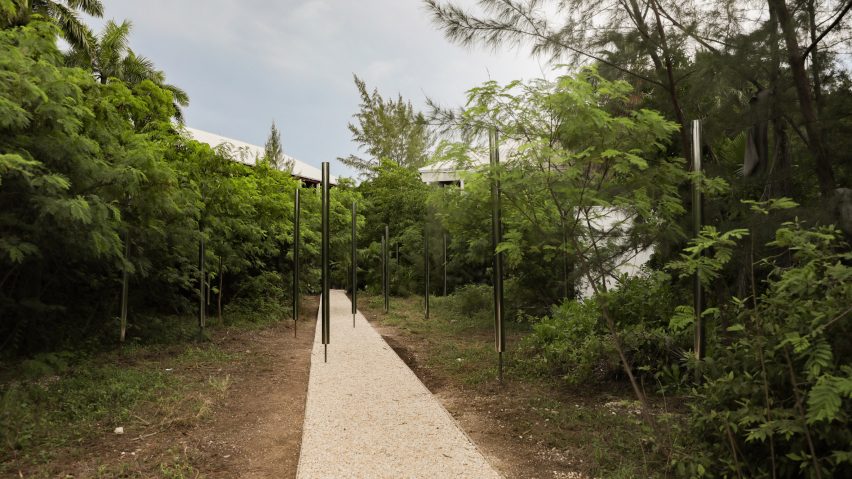Ghanaian studio Limbo Accra has created the Duho Pavilion within the grounds of a ruined hotel on Grand Cayman in the Cayman Islands.
Designed in collaboration with landscape architect Malthe Mørck Clausen, the permanent installation consists of a pebbled path that snakes through the overgrown premises of the hotel, abandoned almost 20 years ago after being damaged in a hurricane.
A series of 30 reflective aluminium poles are arranged around and across this path to form the Duho Pavilion – the latest in a series of installations created by Limbo Accra that relate to unfinished buildings, although this one sits alongside the ruin rather than within it.
"Inspired by the building's organic transformation as an oasis for plant life and various non-human species, such as frogs, serpents, butterflies and lizards, we decided to shift our focus from the building's concrete shell to the new ecosystem it created," Limbo Accra founder Dominique Petit-Frère told Dezeen.
"We were interested in the ecological entanglements of the site and how we could integrate this experience into an architectural gesture," she continued.
"Our goal was to create a space that honours the existing landscape, carving a direct path through and installing reflective aluminium poles along it to blend the boundaries of the pavilion and the natural surroundings."
The pavilion aims to honour the indigenous Taíno culture and was informed by Duho – a ceremonial seat made by the Taíno people.
Each of the 30 aluminium poles that make up the installation measures three metres in high and was chosen to represent five of the 150 Duho stools currently held in private and museum collections, including at London's British Museum and the Saint Louis Art Museum in Missouri.
"With roots from both Haiti and Ghana, I was inspired to pay homage to those who came before me," said Petit-Frère.
"I revisited the stories of my family and looked to the spatial history of the Caribbean region and its indigenous civilisations, particularly the Taínos who occupied Hispaniola – present-day Haiti and the Dominican Republic, Jamaica, Cuba, Puerto Rico and other islands," she added.
"These Duho stools were integral to Taíno culture, serving as conduits to access ancestors and realms of the real and imaginary, making them the perfect object/device for us to channel a new imagination within this space."
The Duho Pavilion was commissioned as part of the Open Palm Residency program at the nearby Palm Heights hotel, which is programming a series of art projects at the abandoned hotel.
The installation was designed to open up the site.
"Before our intervention, the land was extremely wild with lots of vegetation and overgrown plants," explained Petit-Frère. "It was very beautiful but also quite inaccessible. I am particularly interested in the experience of those familiar with the site as this will be a new experience."
"Since inaugurating the pavilion, we've received positive feedback from locals, visitors and guests about the new accessibility and the feeling of being able to feel rooted within this open green garden," she continued.
"I also hope this installation serves as a learning space for discovering hidden stories and knowledge from the region and inspires people to continue to research and investigate further."
Opened in 2019, the nearby Palm Heights hotel describes itself as the Cayman Islands' first boutique hotel. The beachfront hotel is filled with collectible design pieces including Mario Bellini sofas, Ingo Maurer lights and Ettore Sottsass rugs.

